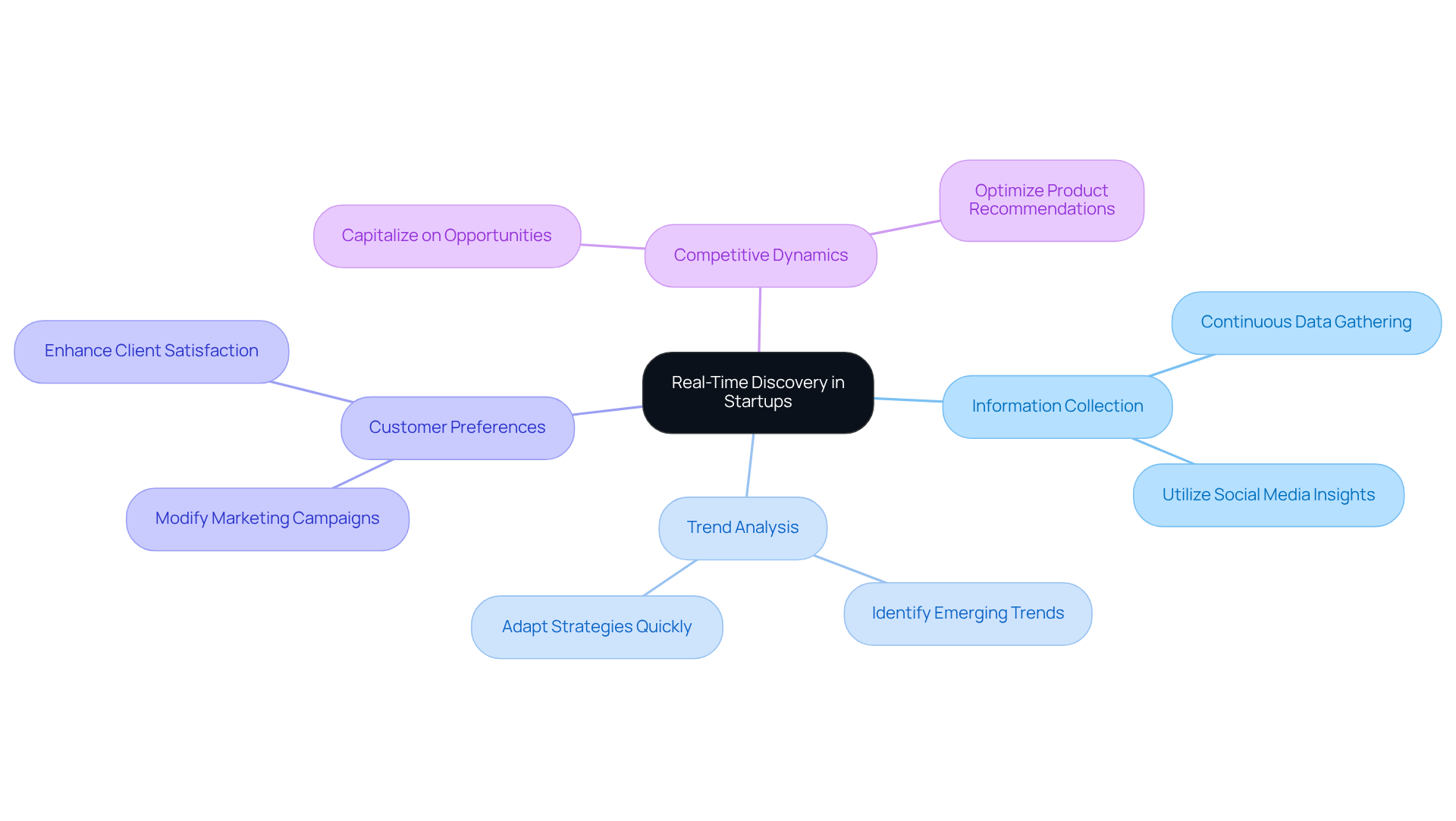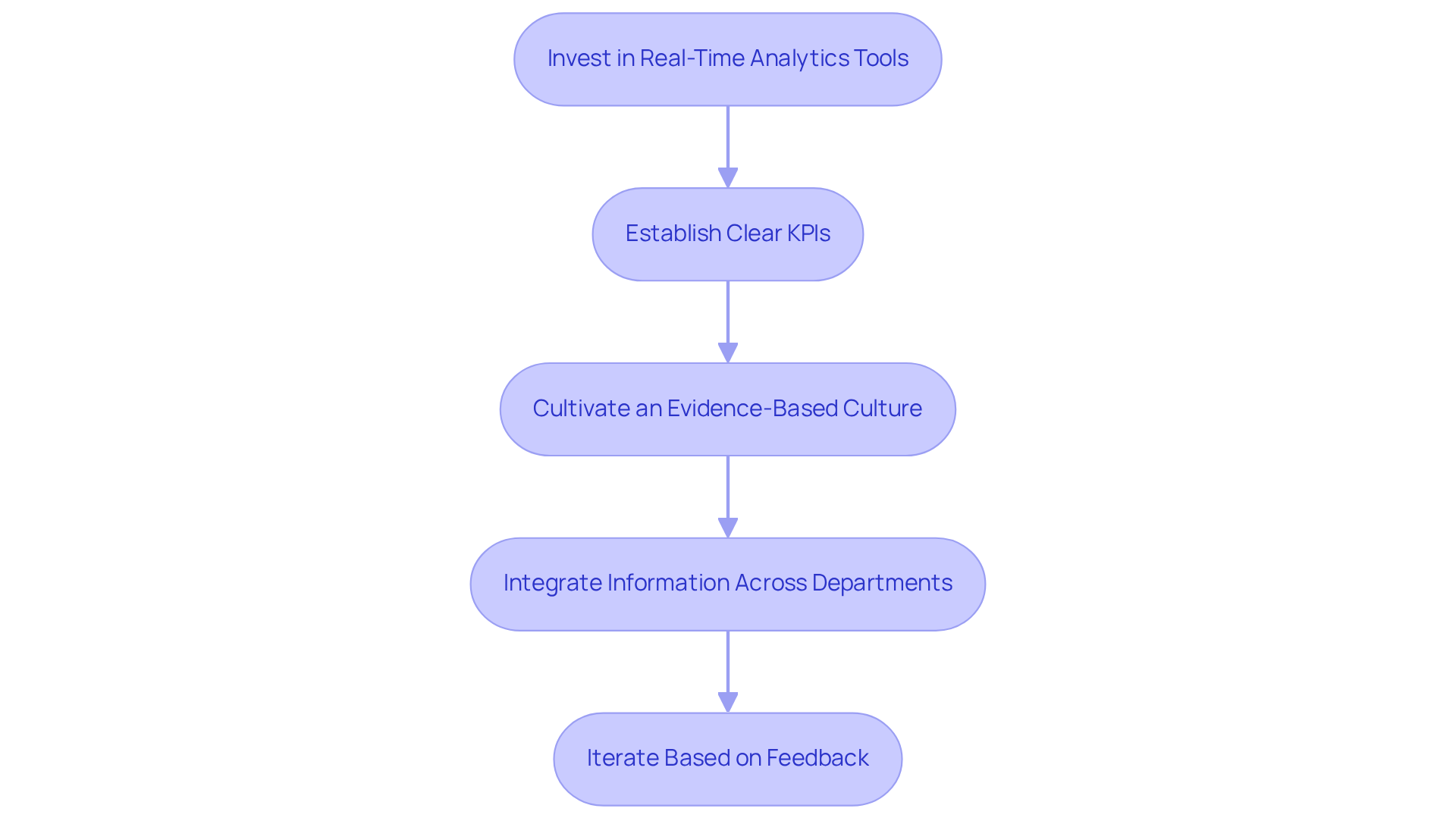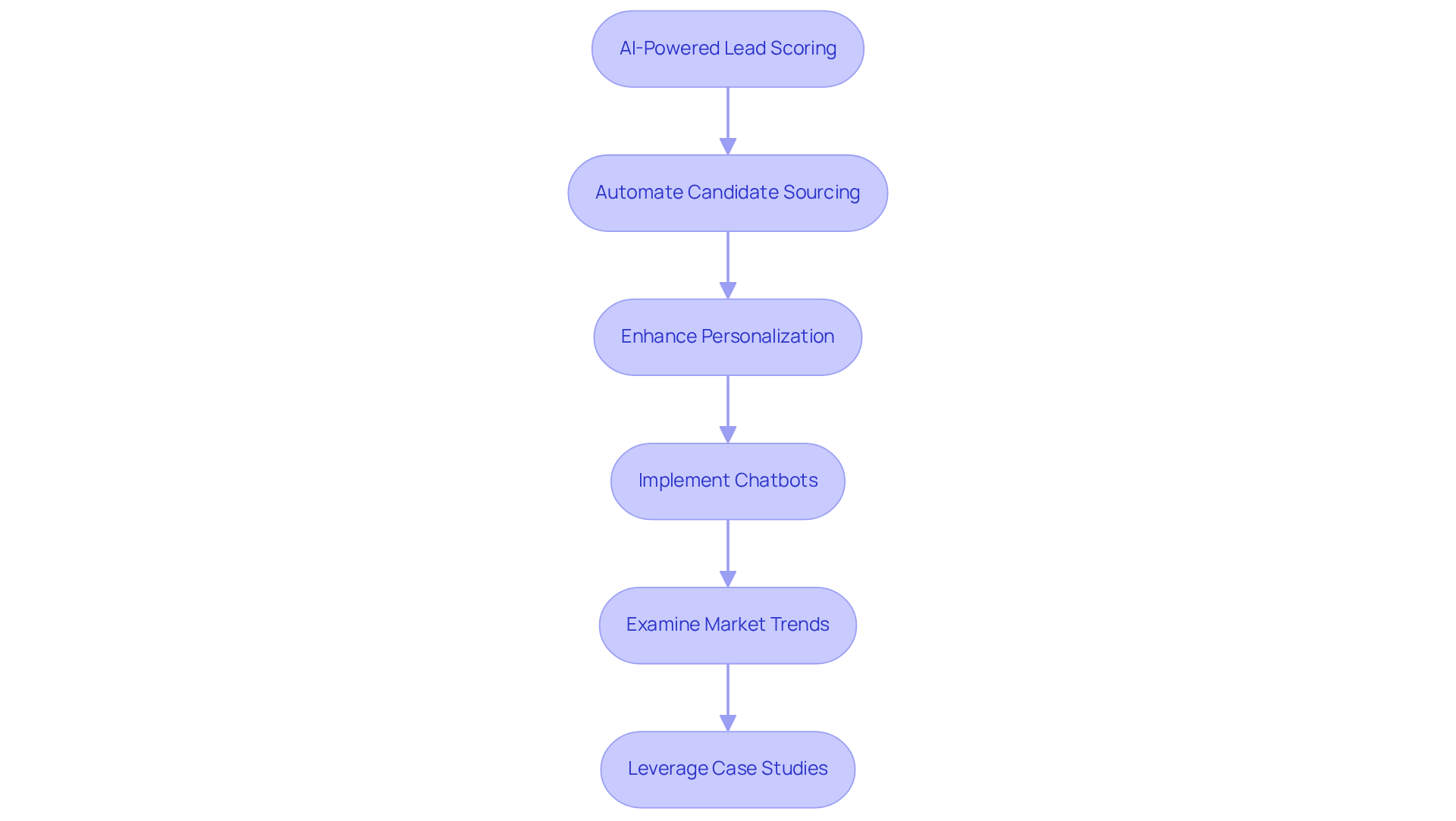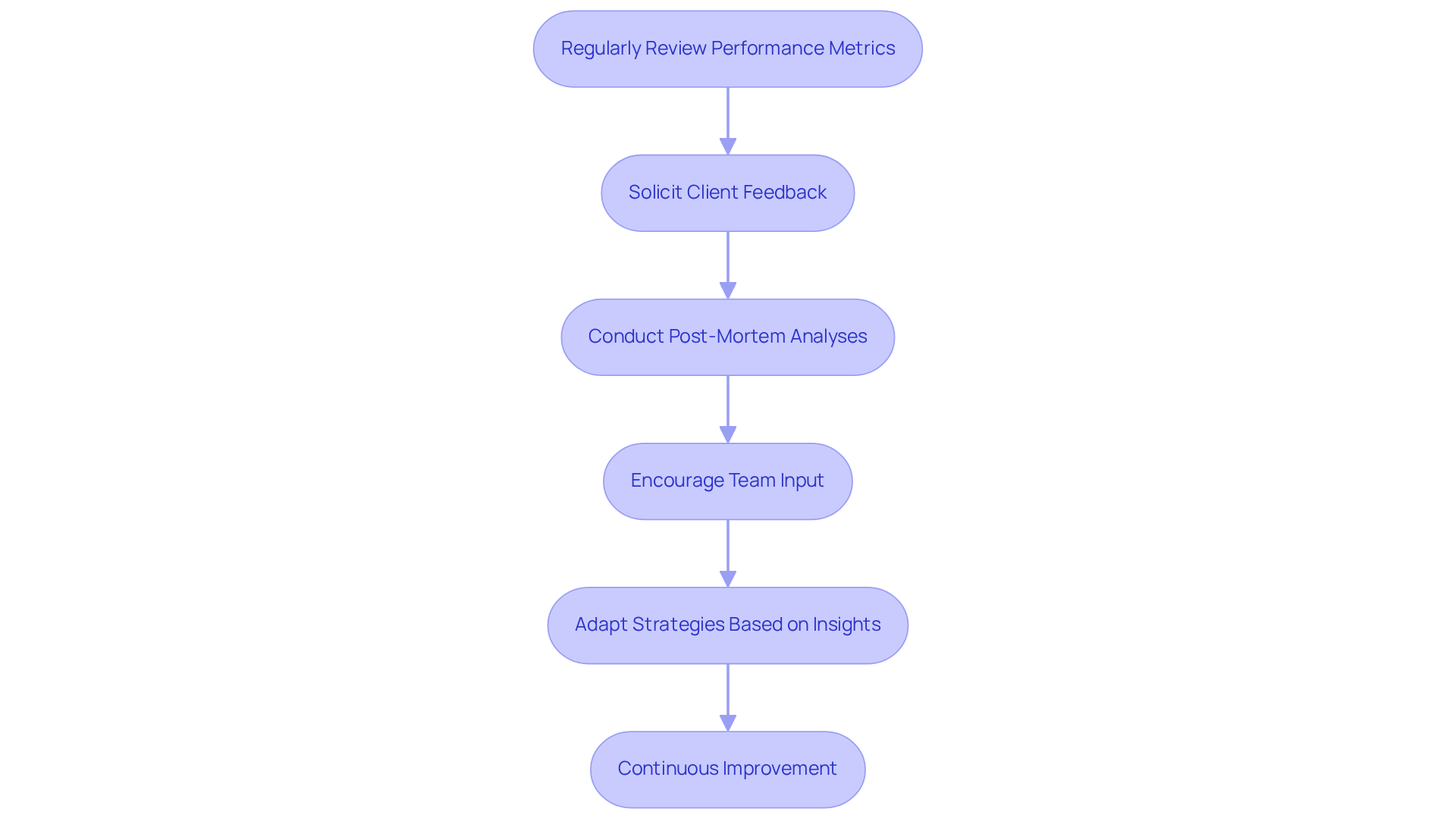Overview
Mastering real-time startup discovery necessitates the implementation of effective strategies that leverage data analytics and AI tools to significantly enhance sales success. By investing in real-time analytics, establishing clear KPIs, and fostering an evidence-based culture, startups can adapt swiftly to market changes. These approaches collectively empower startups to optimize their sales efforts through informed decision-making, ultimately driving better outcomes. Are you ready to transform your sales strategy?
Introduction
Real-time discovery is revolutionizing the startup landscape, enabling agile responses to ever-changing market dynamics. By harnessing this approach, startups can identify emerging trends and align their strategies with customer preferences, ultimately driving sales success. However, a critical challenge persists: how can startups effectively implement these strategies to gain a competitive edge in an increasingly crowded marketplace? Exploring the intersection of real-time data utilization and innovative sales tactics reveals key practices that can propel startups toward sustainable growth.
Understand Real-Time Discovery in Startups
Real-time exploration in new ventures involves the continuous collection and analysis of information to identify emerging trends, customer preferences, and competitive dynamics. Startups that effectively utilize real-time startup discovery can pivot swiftly, adapt their strategies, and capitalize on opportunities ahead of their competitors.
For example, a startup that tracks social media trends can utilize real-time startup discovery to modify its marketing campaigns, ensuring relevance and engagement with its target audience. This agility not only enhances client satisfaction but also drives sales growth by aligning offerings with current market demands.
Companies like Amazon exemplify this approach, utilizing real-time analytics to optimize product recommendations and inventory management, ultimately resulting in increased sales and customer loyalty.

Implement Effective Strategies for Real-Time Data Utilization
To effectively utilize real-time startup discovery, startups must adopt strategic measures that drive impactful results.
-
Invest in Real-Time Analytics Tools: Start by utilizing platforms that offer real-time information processing capabilities, such as Apache Kafka or Amazon Kinesis. Additionally, consider employing AI search software, which provides extensive insights into startups and market trends, enabling real-time startup discovery and prompt analysis of information streams as they arise.
-
Establish Clear KPIs: Define key performance indicators that align with your business objectives. This clarity empowers teams to focus on significant metrics, ensuring that real-time information is harnessed to drive pertinent actions. Websets can further enhance these KPIs with comprehensive company profiles and financial information, facilitating informed decision-making.
-
Cultivate an Evidence-Based Culture: Encourage all team members to incorporate data into their decision-making processes. Training sessions on information interpretation can empower employees to utilize insights effectively. With these tools, teams gain access to deep insights into companies and industries, enhancing their understanding of market dynamics.
-
Integrate Information Across Departments: Ensure that sales, marketing, and product development teams share access to the same real-time information. This integration fosters collaboration and aligns departmental strategies. A centralized platform for thorough real-time startup discovery guarantees that all teams remain informed.
-
Iterate Based on Feedback: Leverage real-time data to gather client feedback and quickly iterate on products or services. This responsiveness can significantly enhance customer satisfaction and retention, supported by the ability to analyze market trends and competitor landscapes.

Leverage AI Tools for Enhanced Lead Generation and Recruitment
AI tools can significantly enhance lead generation and recruitment initiatives for startups, particularly in the context of real-time startup discovery when leveraging advanced solutions. Here are some best practices:
-
Utilize AI-Powered Lead Scoring: Implement AI algorithms that analyze historical data to score leads based on their likelihood of conversion. This prioritization enables sales teams to concentrate on high-potential prospects, thereby increasing the effectiveness of their outreach.
-
Automate Candidate Sourcing with Websets: Employ Websets to automate candidate sourcing. This innovative platform identifies qualified candidates based on specific criteria, enriching data with details such as LinkedIn profiles and previous work experience, which reduces the time spent on manual searches.
-
Enhance Personalization: Leverage AI to tailor outreach efforts. By analyzing consumer behavior and preferences, startups can customize their messaging, which enhances engagement rates and boosts conversion opportunities.
-
Implement Chatbots for Initial Screening: Deploy AI chatbots to manage initial candidate interactions. These bots can conduct preliminary screenings, address FAQs, and schedule interviews, streamlining the recruitment process and allowing teams to focus on more strategic tasks.
-
Examine Market Trends with AI: Utilize AI analytics tools to monitor market trends and consumer behavior. This data can inform product development and marketing strategies, ensuring that offerings align with current demands and enhancing overall market positioning.
-
Leverage Case Studies: Investigate successful case studies where the platform has been employed to improve lead generation and recruitment outcomes. These examples provide valuable insights into the practical applications and effectiveness of real-time startup discovery within the platform.

Continuous Improvement Through Feedback Loops
To foster continuous improvement, startups must implement feedback loops in their operations, leveraging Websets' AI-driven platform.
-
Regularly Review Performance Metrics: Schedule consistent reviews of performance metrics to assess the effectiveness of sales and recruitment strategies. Employing precise lead generation tools enables teams to identify which criteria yield the best results, facilitating informed adjustments.
-
Solicit Client Feedback: Actively seek input from clients regarding their experiences. Incorporating insights from market research capabilities allows startups to gain a deeper understanding of customer needs and preferences, guiding product enhancements and service improvements.
-
Conduct Post-Mortem Analyses: After significant campaigns or recruitment drives, it is essential to conduct post-mortem analyses to evaluate what worked and what didn’t. Utilizing data enhanced by online tools provides a clearer picture of campaign effectiveness and highlights areas for improvement.
-
Encourage Team Input: Create an environment where team members feel comfortable sharing their insights and suggestions. This collaborative approach, combined with insights from customizable search solutions, can lead to innovative strategies and real-time startup discovery.
-
Adapt Strategies Based on Insights: Leverage insights gained from feedback loops to adapt strategies in real-time. Startups can leverage AI-driven tools for real-time startup discovery, allowing them to swiftly react to market shifts and customer demands, ensuring they remain competitive and efficient. For instance, teams utilizing Websets' tools have reported significant improvements in lead quality and recruitment efficiency, showcasing the platform's substantial impact on their operations.

Conclusion
Real-time startup discovery stands as a pivotal strategy that empowers new ventures to thrive in dynamic markets. By harnessing real-time data, startups can swiftly adapt their strategies, ensuring they remain ahead of competitors and effectively meet customer demands. This approach not only fosters agility but also enhances overall sales growth and customer satisfaction.
Implementing real-time discovery requires key strategies such as:
- Investing in advanced analytics tools
- Establishing clear performance indicators
- Fostering a culture that prioritizes data-driven decision-making
Startups must focus on integrating information across departments and leveraging client feedback to iterate on their offerings. Moreover, utilizing AI tools for lead generation and recruitment can significantly streamline processes and enhance personalization, ultimately leading to better engagement and conversion rates.
The significance of embracing real-time startup discovery cannot be overstated. It empowers startups to remain competitive, responsive, and aligned with market trends. As the business landscape continues to evolve, adopting these strategies will not only foster growth but also cultivate a culture of continuous improvement. Startups are encouraged to take actionable steps today to integrate real-time data practices, ensuring they are well-positioned for success in the future.
Frequently Asked Questions
What is real-time discovery in startups?
Real-time discovery in startups refers to the continuous collection and analysis of information to identify emerging trends, customer preferences, and competitive dynamics.
How does real-time discovery benefit startups?
It allows startups to pivot swiftly, adapt their strategies, and capitalize on opportunities ahead of their competitors, enhancing client satisfaction and driving sales growth.
Can you provide an example of real-time discovery in action?
A startup that tracks social media trends can modify its marketing campaigns using real-time discovery, ensuring relevance and engagement with its target audience.
What role does real-time analytics play in companies like Amazon?
Companies like Amazon use real-time analytics to optimize product recommendations and inventory management, which leads to increased sales and customer loyalty.




